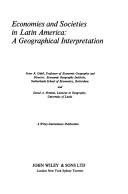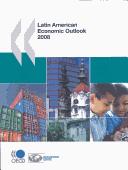| Listing 1 - 10 of 79 | << page >> |
Sort by
|
Book
ISBN: 1282451782 9786612451782 926407791X 9264075216 Year: 2009 Publisher: Paris Cedex, France : OECD,
Abstract | Keywords | Export | Availability | Bookmark
 Loading...
Loading...Choose an application
- Reference Manager
- EndNote
- RefWorks (Direct export to RefWorks)
Contrary to prevailing wisdom, Latin American countries that opened their markets to international competition during the last decade have not been more vulnerable to the global economic downturn. The OECD Latin American Economic Outlook 2010 provides a fresh analysis of economic trends in the region with a particular focus on the role that international migration and remittances play in shaping the current context. "This excellent report correctly emphasises the less known and studied aspects of the complex and heterogeneous phenomenon of migration, allowing a broader vision of the topic." Fr
Book
ISBN: 1281921912 9786611921910 9264051686 9264039171 Year: 2008 Publisher: Paris : OECD,
Abstract | Keywords | Export | Availability | Bookmark
 Loading...
Loading...Choose an application
- Reference Manager
- EndNote
- RefWorks (Direct export to RefWorks)
Are Latin American governments maximising the potential of fiscal policy as a development tool? The 2009 edition of the Latin American Economic Outlook shows that governments in the region could do much more to exploit the ability of fiscal policy to boost economic growth and combat poverty and inequality. ""An important step forward in the dialogue and exchange of experiences between OECD countries and our region."" . -Alicia Bárcena, Executive Secretary, ECLAC. ""This publication will provide those concerned with Latin America's future with valuable lessons for fiscal policy drawn from the e
Economic forecasting -- Latin America. --- Economic forecasting. --- Latin America -- Economic conditions. --- Latin America -- Economic policy. --- Economic forecasting --- Latin America --- Economic conditions --- Economic policy. --- Economics --- Forecasting --- Economic indicators
Book
ISBN: 9264039783 9264030379 Year: 2007 Publisher: Paris : Centre de developpement de l'Organisation de cooperation et de developpement economiques,
Abstract | Keywords | Export | Availability | Bookmark
 Loading...
Loading...Choose an application
- Reference Manager
- EndNote
- RefWorks (Direct export to RefWorks)
Economic forecasting -- Latin America. --- Latin America -- Economic conditions -- 1945-. --- Business & Economics --- Economic History --- Economic forecasting --- Latin America --- Economic conditions --- Economics --- Forecasting --- Economic indicators
Book
ISBN: 3030243931 3030243923 Year: 2019 Publisher: Cham : Springer International Publishing : Imprint: Palgrave Pivot,
Abstract | Keywords | Export | Availability | Bookmark
 Loading...
Loading...Choose an application
- Reference Manager
- EndNote
- RefWorks (Direct export to RefWorks)
For several years, the government of Paraguay has sought to address the issue of informality, both as a response to poverty reduction and a means to expand its tax base. While effort has been undertaken to describe informality, the government lacks the capacity and perhaps the will to analyze the phenomenon through a robust empirical lens. Hence, little is known about the informal economy beyond anecdotes, personal interactions, and description. This book is the first to comprehensively, rigorously, and empirically study the determinants of informality in Paraguay. This book is of vital interest to those studying the Paraguayan economy, development economics, Latin American economics, and informality.
Paraguay --- Economic policy. --- Labor economics. --- Latin America—Economic conditions. --- Development economics. --- Labor Economics. --- Latin American and Caribbean Economics. --- Development Economics. --- Economics --- Economic development --- Latin America --- Economic conditions.
Book
ISBN: 9811576874 9811576866 Year: 2021 Publisher: Singapore : Palgrave Macmillan,
Abstract | Keywords | Export | Availability | Bookmark
 Loading...
Loading...Choose an application
- Reference Manager
- EndNote
- RefWorks (Direct export to RefWorks)
This book explores the achievements and obstacles confronting China and major Latin American countries in developing small- and medium-sized enterprises (SMEs) in the context of new changes in “The Belt and Road” Initiative. In the first three chapters, the Chinese authors elaborate on the relationship between “The Belt and Road” Initiative and globalization, as well as strategies towards forming an increasingly close bond between China and Latin America. The book ends with chapters dedicated to analyzing the BRI conditions and effects on SMEs of Latin-American countries. These country specific chapters will show the specific opportunities and challenges the countries conditions, be they political, geological, etc. may have on the development of SMEs under the BRI. The book will be useful not only to industry leaders looking to better understand how they can potentially benefit from the BRI but also by the general public, as the book will explain what this new era of globalization, and more specifically the BRI, will mean for the world’s industries and society. Yihai Li is Secretary-General of the Shanghai Academy of Social Sciences Think Tank Foundation (SASS-TTF), Vice Chairman of the Centre for Think Tank Studies, Senior Fellow and Co-Director of the International Center for Security and Crisis Management (SCM), and Secretary General of the Shanghai Center for Cultural Studies. Phd. Anibal Carlos Zottele Allende is Director of the China-Veracruz Studies Center (CECHIVER) of the Veracruz University, Director of the magazine Orientando, Professor and researcher of the Veracruz University, Technical Secretary of the Mexican Consortium of APEC Study Centers (CONMEX-CEAPEC) and Honorary advisor and president of the Veracruz Chapter of the Chamber of Commerce of Mexico in China (MEXCHAM).
Book
ISBN: 9789004175914 9004175911 9786612401343 1282401343 9047429354 9789047429357 Year: 2009 Volume: 3 Publisher: Leiden: Brill,
Abstract | Keywords | Export | Availability | Bookmark
 Loading...
Loading...Choose an application
- Reference Manager
- EndNote
- RefWorks (Direct export to RefWorks)
The forces of industrialisation, urbanisation, globalisation and technological change have washed away the pre-modern outlook of most Latin American economies. Despite the improved opportunities of social mobility offered by economic modernisation, current income inequality levels (still) appear extraordinary high. Has Latin America always been unequal? Did the region fail to settle a longstanding account with its colonial past? Or should we be reluctant to point our finger so far back in time? In a comparative study of asset and income distribution Frankema shows that both the levels, and nature, of income inequality have changed significantly since 1870. Besides the deep historical roots of land and educational inequality, more recent demographic and political-institutional forces are taken on board to understand Latin America’s distributive dynamics in the long twentieth century.
Income distribution --- Equality --- Latin America --- Economic conditions --- Equality --Latin America. --- Income distribution --Latin America. --- Latin America --Economic conditions --1982-. --- Economic History --- Business & Economics --- Income distribution - Latin America --- Equality - Latin America --- Latin America - Economic conditions - 1982 --- -Income distribution - Latin America --- -Income distribution
Book
ISBN: 3515023887 9783515023887 Year: 1976 Volume: 10 Publisher: Wiesbaden: Steiner,
Abstract | Keywords | Export | Availability | Bookmark
 Loading...
Loading...Choose an application
- Reference Manager
- EndNote
- RefWorks (Direct export to RefWorks)
History of Latin America --- anno 1800-1999 --- Latin America --- Economic conditions --- Asociación Latinoamericana de Libre Comercio countries --- Neotropical region --- Neotropics --- New World tropics --- Spanish America --- Economic conditions. --- -Addresses, essays, lectures. --- Latin America - Economic conditions

ISBN: 047165258X 9780471652588 Year: 1973 Publisher: London: Wiley,
Abstract | Keywords | Export | Availability | Bookmark
 Loading...
Loading...Choose an application
- Reference Manager
- EndNote
- RefWorks (Direct export to RefWorks)
Latin America --- Amérique latine --- Economic conditions. --- Social conditions. --- Conditions économiques --- Condions sociales --- Economic conditions --- Social conditions --- Amérique latine --- Conditions économiques --- Latin America - Economic conditions --- Latin America - Social conditions

ISBN: 1281720186 9786611720186 9264030360 9264038264 Year: 2007 Publisher: Paris : OECD,
Abstract | Keywords | Export | Availability | Bookmark
 Loading...
Loading...Choose an application
- Reference Manager
- EndNote
- RefWorks (Direct export to RefWorks)
While democratic regimes seem to be firmly rooted in the region, Latin American economies continue to experience sustained economic growth, benefiting from the ongoing process of globalisation. This Latin American Economic Outlook , the first volume in an annual series by the OECD Development Centre, provides original insights and comparative indicators on four key issues affecting Latin America's development: the impact of fiscal performance on democratic legitimacy; the relevance of pension fund reform and governance for national saving and capital markets deepening; the role market-seeking
Economic conditions. --- Economic forecasting -- Latin America. --- Economic forecasting. --- Economic policy. --- Latin America -- Economic conditions. --- Latin America -- Economic policy. --- Business & Economics --- Economic History --- Economic forecasting --- Latin America --- Economic conditions --- Economics --- Forecasting --- Economic indicators
Book
ISBN: 3030047059 3030047040 Year: 2019 Publisher: Cham : Springer International Publishing : Imprint: Palgrave Macmillan,
Abstract | Keywords | Export | Availability | Bookmark
 Loading...
Loading...Choose an application
- Reference Manager
- EndNote
- RefWorks (Direct export to RefWorks)
Using a heterodox perspective, this book discusses the real possibilities of Argentina, Brazil and Mexico ever achieving economic development through industrialization. Through their discussion of the three most industrialized countries of Latin America, the contributors compare trajectories and critically analyze the transformations, challenges and development prospects of the sector at the beginning of the 21st Century. Focusing on the historical evolution of each country’s industrial sector, as well as their productivity, structural transformation, and degree of external dependence and international integration, this book will appeal to those researching the political economy, economic history, industrial organization and economic development in Latin America.
Latin America—Economic conditions. --- Schools of economics. --- Development economics. --- Economic history. --- Latin American and Caribbean Economics. --- Heterodox Economics. --- Development Economics. --- Economic History. --- Economic conditions --- History, Economic --- Economics --- Economic development --- Economics schools of thought --- Schools of economic thought
| Listing 1 - 10 of 79 | << page >> |
Sort by
|

 Search
Search Feedback
Feedback About UniCat
About UniCat  Help
Help News
News